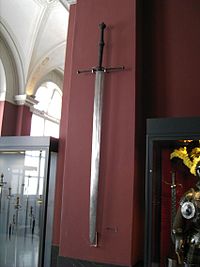Zweihänder
Appearance
English
[edit]
Alternative forms
[edit]Etymology
[edit]Borrowed from German Zweihänder (literally “two hander”), from zwei (“two”) + Hand (“hand”) + -er.
Pronunciation
[edit]- (anglicised) IPA(key): /ˈtsvaɪhɛndɚ/ or IPA(key): /ˈtsvaɪ.hæn.dɚ/
- (like German) IPA(key): /ˈtsvaɪhɛndə/
Noun
[edit]Zweihänder (plural Zweihänder)
- (historical) A two-handed sword primarily of Renaissance Germany, up to a fathom in length, invented in the 14th century.
- Synonyms: Bidenhänder, Bihänder
- Hypernym: two-hander
- 1994, Douglas Miller, The Landsknechts, page 42:
- Their major weapon was the pike, which could be up to 18 feet in length, but those whose duty it was to advance in the front line carried instead the fearsome Zweihänder; an enormous battle-sword around 66 inches in length.
- 1995, R. Coltman Clephan, The Mediaeval Tournament, page 105:
- […] and even the two-handed sword, Zweihänder […]
Translations
[edit]sword
German
[edit]Etymology
[edit]From zwei (“two”) + Hand (“hand”) + -er.
Pronunciation
[edit]Noun
[edit]Zweihänder m (strong, genitive Zweihänders, plural Zweihänder)
- Zweihänder (14th century two-handed sword)
- Synonyms: (obsolete) Beidenhänder, (obsolete) Bidenhänder, (obsolete) Bihänder
Declension
[edit]Declension of Zweihänder [masculine, strong]
Descendants
[edit]- → English: Zweihänder
Categories:
- English terms borrowed from German
- English terms derived from German
- English 3-syllable words
- English terms with IPA pronunciation
- English lemmas
- English nouns
- English countable nouns
- English nouns with irregular plurals
- English indeclinable nouns
- English terms spelled with Ä
- English terms spelled with ◌̈
- English terms with historical senses
- English terms with quotations
- en:Swords
- German compound terms
- German terms suffixed with -er
- German 3-syllable words
- German terms with IPA pronunciation
- German terms with audio pronunciation
- German lemmas
- German nouns
- German masculine nouns
- de:Swords
